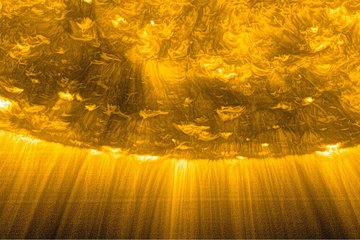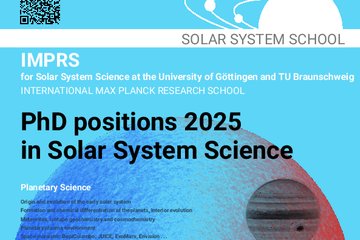U30-Award for MPS Researcher
In his doctoral thesis, Sudip Mandal investigated how special pressure waves help maintain temperatures of several million degrees in the outermost solar atmosphere.
The Department of Plasma Physics of the Association of Asian Pacific Physical Societies (AAPPS) has awarded Dr. Sudip Mandal of the Max Planck Institute for Solar System Research (MPS) this year's U30 award. The AAPPS thus honors Mandal's contributions to the understanding of magneto-hydrodynamic waves in the corona, the outer atmosphere of the Sun. In his doctoral thesis, which Mandal wrote at the Indian Institute for Astrophysics in Bangalore, the young scientist investigated how such waves could help in maintaining the observed, extremely high temperatures of the solar corona. After receiving his PhD, Mandal became a researcher at MPS in 2019.

With several million degrees, the outermost layer of the solar atmosphere, the corona, is incredibly hot. How does the Sun manage to heat this region, which lies well above the much cooler, visible surface of the Sun, to such temperatures? What processes and physical phenomena play a role? So-called slow magneto-hydrodynamic waves offer a possible explanation. They are pressure waves propagating through a magnetically bound plasma, for example from the cooler solar surface into the hot corona. In his doctoral thesis, Mandal investigated whether and how these waves can release their energy into the coronal plasma.
Mandal searched for features of this energy conversion in observations from the space probes (Solar Dynamics Observatory and Hinode). He found that magnetic fields have an important influence on the formation and propagation of these waves. He also investigated how such waves are damped in the corona. In order to better understand both processes, he simulated the complicated conditions in the corona on the computer.
Dr. Sudip Mandal studied M.Sc at the Burdwan University in West Bengal, India. After earning his doctorate at Indian Institute for Astrophysics in Bangalore, he joined the research group "Solar Variability and Climate" at the MPS in 2019. There he evaluates historical data sets with the aim of making reliable and comparable statements about the number of sunspots in past times. Sunspots are a measure of the activity of our star.
With the U30 Prize, the AAPPS annually honors young researchers who are not yet 30 years old and who have already made important contributions to the field of plasma physics.












